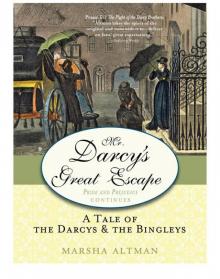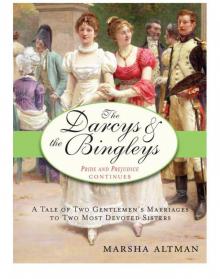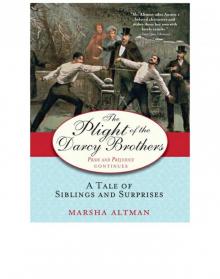- Home
- Marsha Altman
Mr. Darcy's Great Escape
Mr. Darcy's Great Escape Read online
Copyright
Copyright © 2010 by Marsha Altman
Cover and internal design © 2010 by Sourcebooks, Inc.
Cover photo © The Bridgeman Art Library International: The Departure, Green, James (1771–1834)
Sourcebooks and the colophon are registered trademarks of Sourcebooks, Inc.
All rights reserved. No part of this book may be reproduced in any form or by any electronic or mechanical means including information storage and retrieval systems—except in the case of brief quotations embodied in critical articles or reviews—without permission in writing from its publisher, Sourcebooks, Inc.
The characters and events portrayed in this book are fictitious or are used fictitiously. Any similarity to real persons, living or dead, is purely coincidental and not intended by the author.
Published by Sourcebooks Landmark, an imprint of Sourcebooks, Inc.
P.O. Box 4410, Naperville, Illinois 60567-4410
(630) 961-3900
FAX: (630) 961-2168
www.sourcebooks.com
Library of Congress Cataloging-in-Publication Data
Altman, Marsha.
Mr. Darcy’s great escape : Pride and prejudice continues : a tale of the Darcys & the Bingleys / Marsha Altman.
p. cm.
1. Darcy, Fitzwilliam (Fictitious character)—Fiction. 2. Bennet, Elizabeth (Fictitious character)—Fiction. 3. England—Social life and customs—19th century—Fiction. 4. Gentry—England—Fiction. 5. Families—England—Fiction. I. Austen, Jane, 1775–1817. Pride and prejudice. II. Title.
PS3601.L853M7 2010
813’.6—dc22
2009046818
Contents
Front Cover
Title Page
Copyright
Dedication
Chapter 1
Chapter 2
Chapter 3
Chapter 4
Chapter 5
Chapter 6
Chapter 7
Chapter 8
Chapter 9
Chapter 10
Chapter 11
Chapter 12
Chapter 13
Chapter 14
Chapter 15
Chapter 16
Chapter 17
Chapter 18
Chapter 19
Chapter 20
Chapter 21
Chapter 22
Chapter 23
Chapter 24
Chapter 25
Chapter 26
Chapter 27
Chapter 28
Chapter 29
Chapter 30
Chapter 31
Chapter 32
Chapter 33
Chapter 34
Chapter 35
Chapter 36
Chapter 37
Historical Inaccuracies
Acknowledgments
About the Author
Back Cover
Dedicated to
My mother, who taught me that nothing is impossible, even things that are seemingly impossible.
And
My father, who always has his eye out for another book I might like, and is therefore partially responsible for the library that doesn’t fit in my apartment.
Plus all their love and support through the years, et cetera.
Chapter 1
Dearly Beloved
In early April of 1812, four families gathered in Hertfordshire. At this stage, getting them all together was no small task. The guest list of immediate relatives was long and filled with small children, and Longbourn could not host them all. To allow for the proper celebrations of his fourth daughter’s marriage, Mr. Bennet had to rent, ironically, Netherfield. Its current occupants were abroad and consented easily, and so for those few weeks surrounding the wedding of Kitty Bennet, it was filled with Bingleys, Darcys, and Maddoxes. Anyone who needed a breather was welcome to return to Town; no one took it, some not having seen the others since Christmas.
The Bingleys arrived first. “I never thought we would be back,” Jane said to her husband as they entered, carrying their almost one-year-old, fourth child, Edmund.
“Did you despise it so?” Bingley replied. “Charles! Watch it, that isn’t yours to destroy! And if it falls on your sister—” For the Bingley twins were rambunctious six-year-olds and taking full advantage of their new surroundings.
“I did not!” Jane pretended to be affronted as she turned to her eldest. “Georgiana, please make sure your siblings do not immediately destroy Netherfield, or we will have some unpleasant hosts to deal with upon their return.” As her seven-year-old daughter ran off to do as she was told, Jane returned her attention to her husband. “In fact, my memories are only happy. But still, it does feel odd.”
“Life is full of surprises. Eliza! What did your mother say?” Bingley said to his second daughter, who was now trying to balance a dish on her head.
The Darcys were in before the evening meal. “It is official,” an exasperated Darcy said to his brother-in-law. “I never should have taught my son to read.”
“Should I ask?”
“He found this book—I don’t know where he even found it—on the Roman Empire, and sparing no gory detail too. Would you like to know all about the great battles of Caesar? Because now I know all about them because Geoffrey can’t quite read the more difficult words, and so I had to be alert enough to read those segments to him.”
Bingley smiled. “The whole way?”
“He did have to take breaks to breathe, occasionally,” said Elizabeth, as she saw to the bringing in of her infant daughter Sarah, named after Mrs. Gardiner, who was only three months old. Behind her trailed Anne, now four, and Geoffrey, now seven. “And there was that whole hour where I complained of a headache and he believed me.”
“Uncle Bingley!” The two children ran to greet him. Geoffrey bowed, and then looked up and said, “Did you know Caesar married Cleopatra even though he had a wife in Rome when he conquered Egypt?”
“I vaguely recall something of that nature, and I will not doubt your scholarship, Master Geoffrey. But can this perhaps wait until your parents and sisters are settled?”
“How about it waits until forever?” Darcy said. “Or at least until I’m not in the room.” He gave his son a playful pat on the head before being escorted to his chambers.
The Maddoxes were the last of the three families to arrive in Netherfield. Their relation was distant, but in her time in Town, Kitty Bennet had fallen under Mrs. Maddox’s wing, and though Elizabeth initially had her doubts about the former Miss Bingley training her sister on how to court men, very encouraging letters arrived from both Kitty and Georgiana that put her fears aside. Georgiana Darcy was still unmarried, a situation that was hardly dire, but it was clear she would need some encouragement, as she was still shy and hesitant. If she did see men, she had yet to present her brother with a possibility of a match, no matter how much Elizabeth assured her that he was warming to the idea. In fact, Mrs. Maddox knew the most about Mr. Townsend, Kitty’s groom, beyond Georgiana, and she was a wealth of information, because even though marital felicity had obviously softened some of her character, she still did love to gossip. The doctor, of course, hardly said anything, except that he thoroughly approved of the man.
Mr. Townsend had no claim to any titles, but like Bingley, had inherited a fortune from his father in trade, and would provide adequately for Kitty, who now insisted on being called Catherine. He stayed a respectable distance away in Meryton but called on them every ni
ght. When the Bennets had a crowded guest list, he was invited to Netherfield. He was an amiable man, young but eager to be settled, lacking brothers or sisters and obviously wanting to buy an estate and build a family, and to do so with Catherine Bennet. Whether they would be a good match in the long run was impossible to determine, of course, but for the moment no one had any objections. He even seemed interested in Netherfield, if the owners would quit it, or a reasonable estate in the county, which suited Mr. Bennet very well.
The distance was long between Hertfordshire and Derbyshire, and until the birth of Joseph Bennet and Mr. Wickham’s death, Mr. Bennet had always toyed with the idea, privately, of moving the family up north. Now that Longbourn was filled again, it was out of the question. Though he repeated openly that he loved all of his grandchildren, and no one had any doubt that he did, it was obvious that he cherished little Joseph in a special way, and perhaps the greatest gift Mary had ever given him was having a child out of wedlock. And there were the Wickham children, who he said in letter form, were “doing better under Longbourn’s roof, I think,” and left it at that.
What he was well aware of, because Lydia made no secret of it, was that Darcy had set up trust funds for both Wickham children after their father’s death. George and Isabella would, upon the age of majority, have a decent inheritance. It was meant to be discreet, but since Lydia was denied all access to the funds, she made a habit of regularly mentioning it. To which Elizabeth could only shrug her shoulders and say her husband was a mystery to her sometimes, which he very well was not.
The day before the wedding, as if there was not enough chaos in Hertfordshire, Mr. Bennet requested a special dinner at Longbourn with a very exclusive guest list. Father, mother, and five daughters sat down at the table, sans children, husbands, and relatives.
“When was the last time we were all here?” Jane asked.
“Since our weddings,” Elizabeth said, “or perhaps—the day before; I don’t recall eating much that morning. I was so nervous.” She noticed Kitty’s look. “And all for nothing, everything came out perfectly.”
“Yes, yes, and I’m still alive, despite predictions of otherwise,” Mr. Bennet said. “Who knows—I may outlive Mr. Collins! And then all of that fretting and shouting will have been for naught.”
“Naught!” Mrs. Bennet said. “Naught! Who told you to call on Mr. Bingley? Who escorted our girls to balls?”
“Papa, she has caught you,” Elizabeth smiled at her father. “Mama did show initiative in seeing us wed.”
“Ah, it must be my very old and tired brain that fails to recall something of that nature. But perhaps it was so,” he said. “Lizzy, I am sorry to inform you that while you have enjoyed your grand estate in Derbyshire, your poor Papa has been succumbing to senility. And my hearing is going also.”
“Your hearing isn’t going!” Lydia said. “You just use that excuse to ignore us!”
“What?” Mr. Bennet looked at his youngest daughter. “What was that? I’m afraid you said something and I didn’t hear it. Surely it wasn’t a comment at my expense.”
Elizabeth and Jane stifled their laughter with a harsh look from their mother. “Don’t laugh! You don’t have to put up with him!”
“One minute you pray I do not expire and let Mr. Collins have the run of the place, and the next you seem to wish me gone,” Mr. Bennet said. “Such contradictory notions are positively befuddling to my old mind. No, I promised myself to teach Joseph to speak Italian, and I cannot do that very well from the grave, now can I? So you will just have to wait a few years, my dear.” He patted his wife on the hand.
“Mr. Bennet!”
Elizabeth turned to Jane, “So much has changed—and yet, so little.”
“On this, Lizzy, I must soundly agree.”
***
The chapel was filled with everyone even remotely connected to the Bennets, which by this time was quite a large crowd. The only person missing from the Darcy family was Grégoire Darcy, who was in a monastery in Austria and was just beginning his long journey to England for a visit and could not be expected until later in May. Similarly missing was Brian Maddox, who had left to marry his Austrian princess and, by very delayed and slow-arriving letters, was apparently doing well and was happy with the arrangements. Or that was all the doctor would say, but he was never known to lie, only to be discreet.
Joseph Bennet was the ring bearer, and the children that were permitted in the chapel were properly shushed for the entirety of the ceremony. Eventually, when the vicar seemed to get around to it, Mr. and Mrs. Townsend were united in marriage, and Mrs. Bennet had yet another daughter married. True, she still had two under her roof; Lydia had thrown off her widow’s weeds two years before, but there was no doubt that she would be romancing some officer before long. Mary was another matter, but Mary had (unofficially, for it belonged to her father) a fortune, and proclaimed no intentions to even consider marriage until Joseph was of the age where he could take care of himself. And so, even with two daughters technically unmarried, the Bennet family was more at peace than it had ever been. In fact, Mrs. Bennet’s behavior (besides sobbing at the ceremony) could almost be described as pleasant. The wedding breakfast was long and joyous before they saw the couple off to Town. It was later in the evening, when finally all the children were to bed, that the temporary occupants of Netherfield were alone. Everything was all well and settled in the Bennet family, so talk turned to other things.
“And how is Mr. Maddox?” Elizabeth said, referring to the doctor’s brother, as they all sat in the sitting room.
“Currently? I’ve no idea,” Dr. Maddox answered. “But three months ago, he was quite well. It seems to be how long the post takes nowadays from Austria.”
“Will they ever visit? Him and…”
“Nadezhda,” he said. “I think I pronounced that right, but at the moment, no. He is caught up with… baronial business.”
“I think my brother-in-law is a concubine,” Mrs. Maddox said.
“He is not!” said her horrified husband. “Just because he was won in a bet… with her father… does not mean they are not properly married in the eyes of whatever gods they have in the wilds of the Carpathians!”
“They are Christian,” Darcy said, but added, “I think.”
“The Russias are Orthodox Christian, are they not? And the Russias are even farther east,” Bingley said, “so one could logically conclude they are.”
“But the Turks, to their south, are not,” Elizabeth said. “You don’t think—there isn’t any reason why the French would have business in his part of Austria, would they?”
“Have business?” It took the good doctor a second to comprehend her meaning. Women, after all, did not discuss military matters. She must have meant invade. “Napoleon would be a fool to go to Russia. It’s massive and, from what I’ve heard, freezing. And Brian is practically on the border.”
It was a truth that any discussion of people abroad could only lead to the current politics, which were at the same time both unsettling and fascinating. The self-proclaimed emperor of France was now gallivanting across Europe, having already been to Italy and Africa, and as each country fell, the embargo on Britain tightened, to the point where almost everyone was feeling it. Darcy’s fortune was so caught up in local land that it was hardly affected by international politics, but only Elizabeth and the Bingleys knew that he had quietly been settling disputes with his workers, who were concerned by the taxes and their own livelihoods. Bingley had land as well, but not quite so much, and lived largely off his massive inheritance. Time and time again, Darcy urged him to sell his remaining interest in the old shipping company that his father had run, but despite his profession as an idle gentleman with no business in business, Bingley refused. Whether it was nostalgia or actual concern was not something anyone could pry from him, but since the business was the cloth and silk trade, it would likely go under
if the embargo did not end soon. All anyone really knew about the specifics was that Bingley was spending an awfully large amount of time running back and forth between Derbyshire and Town.
The Maddoxes, of course, were tied to the Crown, which was in no real danger unless there was an invasion, and England had not been invaded in seven centuries. When asked about the Prince Regent, Dr. Maddox merely replied, “I doubt very much His Highness would put himself in harm’s way,” which, for the extremely circumspect doctor, was a long answer about his patient.
The only remaining variable—beyond Brian Maddox, who could make himself in danger even in Town—was Grégoire in Austria. True, no one believed that the insane dictator of France would go so far as to start killing his ally’s civilians, especially ones who were technically French, but the pesky embargo did mean that the letters between the Darcy brothers were slowed to the point of being almost months apart.
Bingley, as usual, broke the awkward and worried silence, “To relatives far away.”
Everyone was willing to toast to that.
***
“Why can’t adults ever say anything interesting?” Geoffrey Darcy said from the other side of the door.
“I know! I want to hear about war!” Georgie Bingley said in disgust. “Give me the glass.” As it was passed to her, she put the glass to her ear and against the door. “Still nothing.”
“I want to listen! I want to listen!” Charles Bingley the Third said a bit too loudly, causing both of them to scowl at him.
“You’re going to make them hear us,” Georgie whispered.
“And then we’ll get in trouble,” Geoffrey said, wrestling with his younger cousin. “So be quiet.”
“But I want to hear!”
Geoffrey and Georgie exchanged exasperated glances. They were both a year older than Charles, at an age when it made a significant difference.
“Charles,” Georgie said, “if you don’t go back to the nursery right now, I’ll tell Papa and he’ll give you a thrashing because you’re a boy, and he won’t give me one because I’m a girl.”

 The Knights of Derbyshire
The Knights of Derbyshire Other Tales: Stories from The Ballad of Gregoire Darcy
Other Tales: Stories from The Ballad of Gregoire Darcy The Ballad of Gregoire Darcy
The Ballad of Gregoire Darcy Mr. Darcy's Great Escape
Mr. Darcy's Great Escape The Darcys and the Bingleys
The Darcys and the Bingleys The Plight of the Darcy Brothers
The Plight of the Darcy Brothers The Road to Pemberley
The Road to Pemberley